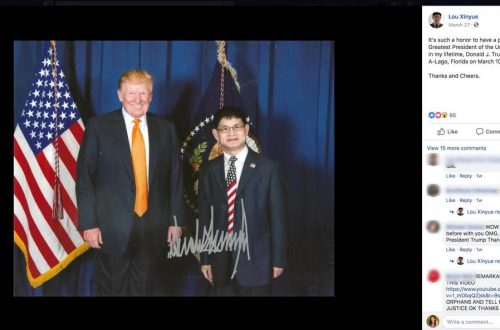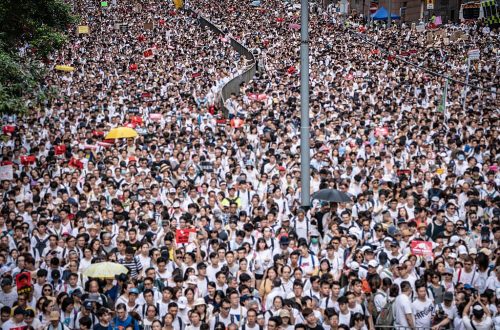As tens of thousands of people fill the center of Hong Kong to demand the right to choose their leaders freely and democratically, the communist government in Beijing reached out— not to the demonstrators but to Hong Kong’s business elite.
With political tension in the southern Chinese financial hub at its highest in years, China’s leaders summoned dozens of the city’s tycoons earlier this week for talks.
The rare trip by the large contingent of business leaders to meet President Xi Jinping in Beijing highlighted the unlikely role that Hong Kong’s capitalists have played as longstanding supporters of China’s communist rulers.
“I see most of my old friends,” Xi said with a light chuckle as he sat down for the meeting with 70 of Hong Kong’s richest and most powerful people.
Seated next to him in the Great Hall of the People was billionaire businessman Li Ka-shing, Asia’s wealthiest person, who Xi greeted with a hearty double-handed handshake. Between them was Tung Chee-hwa, son of a shipping magnate who China anointed as Hong Kong’s first leader after taking back control of the former British colony in 1997. Other Hong Kong billionaires with interests in property, media, banking and finance and casinos filled out the ranks.
…..
Beijing used the meeting to reinforce its message that candidates for Hong Kong leader in promised elections must first be screened by a committee in tune with the priorities of China’s leadership. The stance has sent tensions soaring in the former British colony. Surveys show the approval rating of the city’s Beijing-backed leader, Chief Executive Leung Chun-ying, is plummeting while distrust of China’s central government is at the highest level since the handover.Discontent, especially among the young, is fuelled by a widening wealth gap that many blame on the billionaires, a large number of whom made their fortunes in property development and also sit on a panel that selects Hong Kong’s leader. Once revered for their business acumen, they’re now reviled for cozy ties with the government, which tightly controls the supply of land for development, making home ownership unaffordable for many.
Monday’s meeting was the first time that such a big delegation has travelled to the Chinese capital since 2003. That year, a similar group made the journey after more than half a million took to the streets to protest a deeply unpopular plan to introduce anti-subversion legislation.
For the tycoons, supporting China’s communist leaders ensures their business interests survive, analysts said.
And I found this especially interesting:
Hong Kong’s tycoons are also worried about other reforms demanded by democracy activists, chiefly replacing seats in the legislature held by business groups with directly elected ones, said Sonny Lo, a governance expert at the Hong Kong Institute of Education.
Big business is concerned that if its say in the legislature is eroded, the freewheeling capitalist hub could be put on a path to a European social welfare state by requiring companies to provide more benefits to workers, he said.
Last month, a Chinese legal scholar on a committee overseeing Hong Kong’s mini-constitution made a rare acknowledgement that these concerns are also on Beijing’s mind.
“To some business elites, if the democrats can capture the entire Legislative Council, then social welfarism would likely be the result that would undermine the economic prosperity of Hong Kong,” Lo said.
It was only last summer that the “Big Four” accounting firms– Ernst & Young, PricewaterhouseCoopers, Deloitte and KPMG– published a newspaper advertisement denouncing the pro-democracy protests in Hong Kong.
However:
[A]nother advert appeared in Hong Kong’s Apple Daily newspaper, purportedly placed by employees of the Big Four, which admonished the firms’ bosses. In white characters against a black background, the employees wrote: “hey boss, your statement doesn’t represent us”—a double entendre in Cantonese, as “hey boss” is also a mild vulgarity expressing angered disbelief.
It reinforces my belief that when it comes to a crunch, communists and capitalists have more in common with each other than they have with social democrats.
Isn’t that right, Andy Newman?


